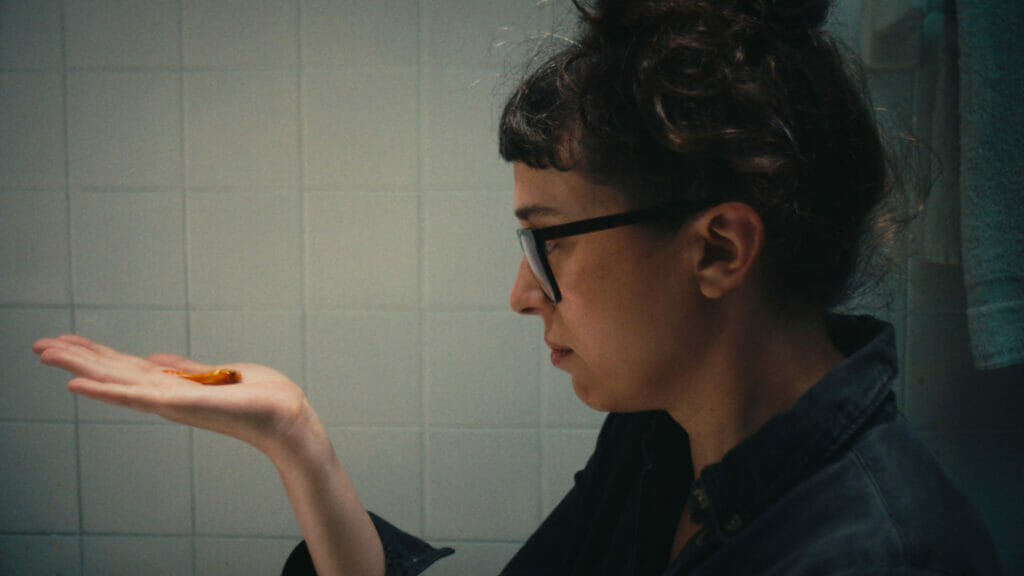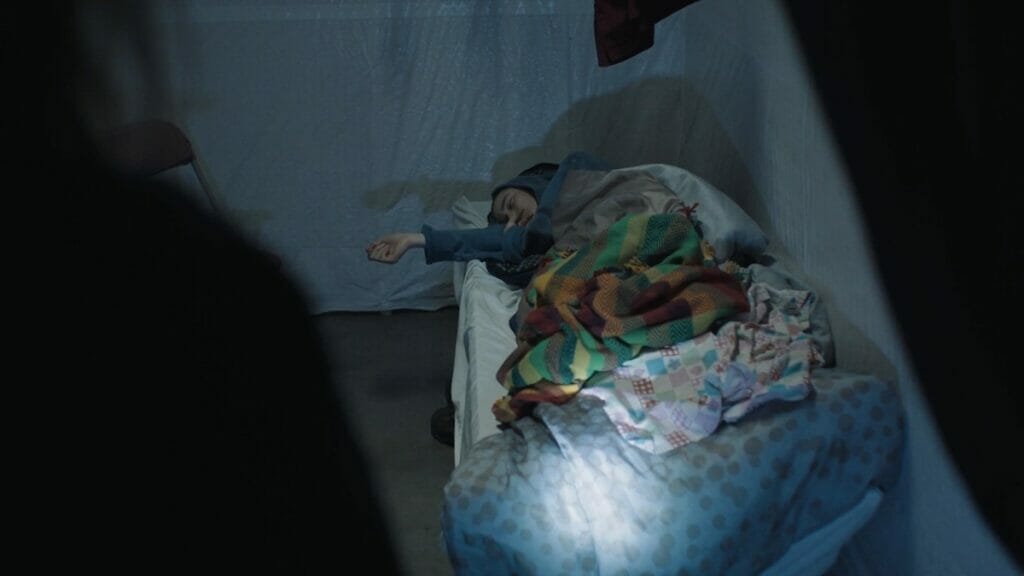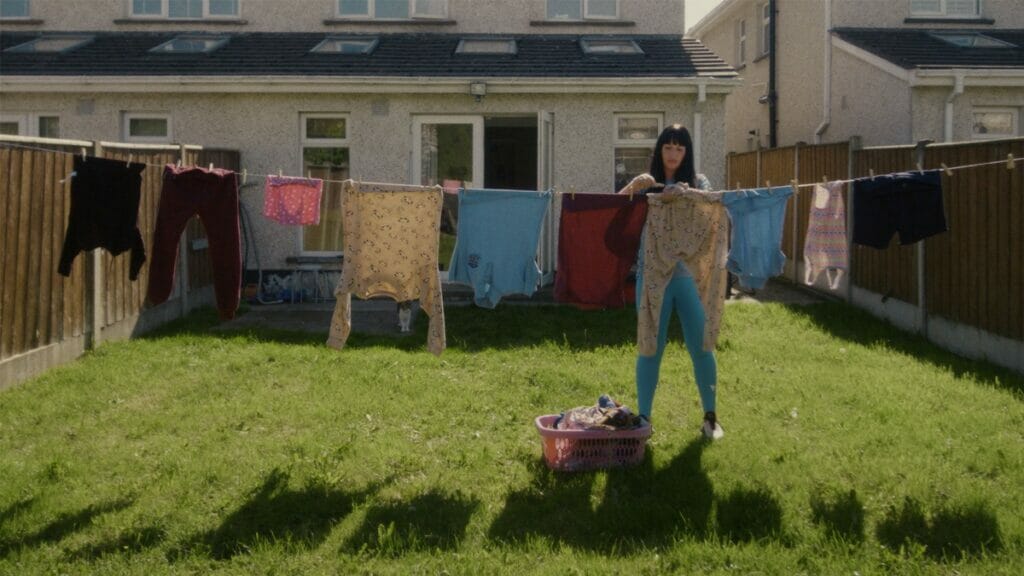CCFF’s second short of shorts explores humanity’s need for community.
One could theoretically group the first program of shorts at the Chicago Critics Film Festival as stories of the individual’s pursuit of liberty and happiness. The second program, on the other hand, highlights our need for community and the things we find in each other. Equally as evocative as the films in the first, these seven short films run the gamut between myth and reality in various mediums, each celebrating how relational life is.
There is no finer example than Troy. Thea and Charlie (Adina Verson and Michael Braun) live in an apartment building with very thin walls. Their neighbor Troy has loud sex—a lot. Director Mike Donahue makes space for us on their couch as we watch the noise change from nuisance to delight. Soon, Troy’s sex life begins to inspire their own. Before long, the couple develops a farcical obsession. Their parasocial relationship stalks him as he goes through a crisis and breakup. Even when he’s long gone, Troy’s legacy continues to resonate through their lives. This simple comedy of city living is a poetic expression of how shared space becomes shared intimacy. It’s a tender look at how we share lives with strangers and the changes that can happen when we’re open to care and caring.

Zora Kovac’s animated short, Sprout, shows us just how transformative care can be. Using a style of animation that recalls vintage pulp television cartoons and Hanna-Barbera replicants, the gentle story of a lonely scientist has a delicate but surreal sensibility. The miracle child, part vegetable, part metal, who grows in his care returns the kindness in a simple but life-changing way for the scientist. He’ll be forever changed long after the root-bot is gone. Without saying much, Sprout is an enchanting fable about mutual care and the personal growth that springs from it.
Though in a starkly different genre, A Shore Away tells a story with a remarkably similar sentiment. Set in an actual housing shelter in Montreal, Canada, Gaëlle Graton’s tale of human compassion is an aching reminder that empathy makes all the difference, even when things don’t always progress linearly. Genevieve (Judith Baribeau) is a custodian at the shelter. Every day she’s there to ensure everything is clean and runs as it should. It’s tough but honest work, as fulfilling as it is frustrating.

Especially when Camille (Rosalie Fortier) arrives back at the shelter. Genevieve had personally seen Camille placed somewhere, yet here she is again. What transpires between the two is a candid and humanistic dialogue about the realities and precarities of being poor in the West. Both women are demoralized by the system, emotionally exploding out of hopelessness. But Graton’s compassion reaches a warm and kind resolution, both finding shelter in their friendship and support.
Community, aid, and care are essential elements for surviving this stage of capitalism, as Tara O’Callaghan’s bold docushort Call Me Mommy demonstrates. Unable to care for her children with the limited options available, Sinead turned to sex work. There she found success, proving quite good at it. O’Callaghan’s wry slice-of-life documentary shows the lived realities of (mostly) digital sex work and the lives of the people in front of the camera. Sinead masturbating for patrons with piles of laundry just out of frame is a hilariously real moment, conveying many of the job’s appeals. She can balance a busy schedule as a mom to her children and other young girls in the industry.
Though the doc takes time to talk about her past trauma, Sinead’s main struggle is present society. She’s providing a handsome living for her family while being self-enterprising like we’re told all good Americans should be. Yet, she still faces social and family stigma. O’Callaghan’s wry slice of life short is a fiery and whip-smart reminder that everything and everyone has their context.

In Yoko Yuki’s jaw-dropping animated short, In the Big Yard, In the Teeny-Weeny Pocket, context is everything. This free-flowing work of Crayola noise art is an experience. Filled with surreal chaos as we travel around a wild mandala, this is a work of poetry, its narrative constructed out of visual and symbolic rhymes, faux-proverbs, and silent film intertitles. What’s it “about”? I have no idea. It seems to be about everything.
A young girl cuts through her own ecstatic chaos in the program’s concluding film, Sèt Lam. Shot in richly textured greyscale, Vincent Fontano’s story of tradition and myth is a powerful visual film that feels outside of time. Once we pass the crowded dance and into the inner sanctum of Grandma’s lap, we enter the world of legend. She tells us why the ritual dance first began and the battle it continues. In her stories, we see the past, present, and future and how the cosmic struggle with Death has shaped her people and will continue to do so. The Dance helps keep Death at bay. Floating between legend and parable of the present, Sèt Lam is a bold and rapturous story of why we need myths and each other.
All of the films in this miraculous second program of shorts highlight relationships between neighbors, family, society, or symbols. From farce to realism, documentary to animation, the films in this program realize the connection between medium and message. A director’s role is to complete the triangle between cinema, idea, and audience. These films invite us into intimate relationships, forging something new with the people around us.
Read next: The Spool's Best New Releases
Streaming guides
The Best Live TV Streaming Services With Free Trial
The praises of live TV streaming services don’t need to be further sung. By now, we all know that compared to clunky, commitment-heavy cable, live TV is cheaper and much easier to manage. But just in case you’re still on the fence about jumping over to the other side, or if you’re just unhappy with ... The Best Live TV Streaming Services With Free Trial
How to Watch Power Book III: Raising Kanan Season 3
Season 3 of the hotly anticipated Power spin-off, Power Book III: Raising Kanan, is arriving on Starz soon, so you know what that means: it’s the ’90s again in The Southside, and we’re back with the Thomas family as they navigate the ins and outs of the criminal underworld they’re helping build. Mekai Curtis is ... How to Watch Power Book III: Raising Kanan Season 3
How to Watch Doctor Who: 60th Anniversary Specials
Ladies and gentlemen, we’re so back! To celebrate Doctor Who’s 60th anniversary, the BBC is producing a three-episode special starring none other than the Tenth/Fourteenth Doctor himself, David Tennant. And to the supreme delight of fans (that would be me, dear reader), the Doctor will be joined by old-time companion Donna Noble (Catherine Tate) and ... How to Watch Doctor Who: 60th Anniversary Specials
Which Netflix Country has Interstellar?
Maybe you’ve just seen Oppenheimer and have the strongest urge to marathon—or more fun yet, rank!—all of Christopher Nolan’s films. Or maybe you’re one of the few who haven’t seen Interstellar yet. If you are, then you should change that immediately; the dystopian epic is one of Nolan’s best, and with that incredible twist in ... Which Netflix Country has Interstellar?
Which Netflix Country Has Each Movie of The Hunger Games?
For whatever reason, The Hunger Games series isn’t available in the same countries around the world. You’ll find the first and second (aka the best) installments in Hong Kong, for instance, but not the third and fourth. It’s a frustrating dilemma, especially if you don’t even have a single entry in your region, which is ... Which Netflix Country Has Each Movie of The Hunger Games?
How to Watch ESPN With A Free Trial
One of the major concerns people have before cutting the cord is potentially losing access to live sports. But the great thing about live TV streaming services is that you never lose that access. Minus the contracts and complications of cable, these streaming services connect you to a host of live channels, including ESPN. So ... How to Watch ESPN With A Free Trial
How to Watch Paramount Network With a Free Trial
To date, Paramount Network has only two original shows on air right now: Yellowstone and Bar Rescue. The network seems to have its hands full with on-demand streaming service Paramount+, which is constantly stacked with a fresh supply of new shows. But Yellowstone and Bar Rescue are so sturdy and expansive that the network doesn’t ... How to Watch Paramount Network With a Free Trial
How to Watch WE TV With a Free Trial
Previously “Women’s Entertainment,” We TV has since rebranded to accurately reflect its name and be a more inclusive lifestyle channel. It’s home to addictive reality gems like Bold and Bougie, Bridezillas, Marriage Boot Camp, and The Untold Stories of Hip Hop. And when it’s not airing original titles, it has on syndicated shows like 9-1-1, ... How to Watch WE TV With a Free Trial
How to Watch Comedy Central With a Free Trial
It’s no coincidence that many of today’s biggest comedians found their footing on Comedy Central: the channel is a bastion of emerging comic talents. It served as a playground for people like Nathan Fielder (Fielder For You), Ilana Glazer and Abbi Jacobson (Broad City), Tim Robinson (Detroiters), and Dave Chappelle (Chappelle’s Show) before they shot ... How to Watch Comedy Central With a Free Trial
How to Watch FX With a Free Trial
You’d be hard-pressed to find a bad show airing on FX. The channel has made a name for itself as a bastion of high-brow TV, along with HBO and AMC. It’s produced shows like Atlanta, Fargo, The Americans, Archer, and more recently, Shogun. But because it’s owned by Disney, it still airs several blockbusters in ... How to Watch FX With a Free Trial
How to Watch TNT Sports With A Free Trial
For many sports fans, TNT is a non-negotiable. It broadcasts NBA, MLB, NHL, college basketball, and All Elite Wrestling matches. And, as a bonus, it also has reruns of shows like Supernatural, Charmed, and NCIS, as well as films like The Avengers, Dune, and Justice League. But while TNT used to be a cable staple, ... How to Watch TNT Sports With A Free Trial